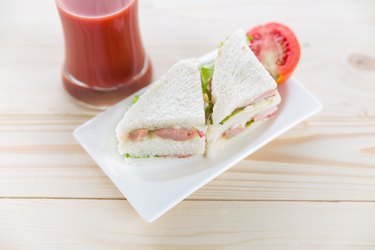
You can burn fat and eat carbs. You just need to understand how fat accumulates and what you can do to burn it off. A good diet plan should not omit healthy carbs. Use calorie counting as well as exercise to help your burn fat while still enjoying the healthy benefits of whole grains, fruits and vegetables.
Calorie Balance
Video of the Day
The key to burning fat is through calorie balance. No matter what you eat -- carbs, protein or fat -- it all contains calories. When you eat more calories than your body needs, your body stores them as fat. Burning fat means eating less calories than your body uses. When you consume less than your body needs, your metabolism is forced to turn to your fat stores for energy. Reaching a caloric deficit means eating less and moving more.
Video of the Day
Burning Fat With Eating
One pound of fat contains 3,500 calories. To reduce your weight by one pound per week, you need to reach a caloric deficit of 500 calories per day. No matter what you eat, carbs or not, reaching a daily caloric deficit means fat is being burned. Cut calories by eating smaller portions and substituting low-calorie foods for higher-calorie ones. Keep a food journal to record your calories, which assures that you are not overeating.
Factoring In Carbs
The best type of carb to include in your diet is a whole grain one. When you eat processed carbs full of refined sugar and processed grains, your blood sugar is affected greatly. These types of foods drastically raise your blood glucose. When your blood glucose is high and drops suddenly, you are more likely to become hungry sooner. In addition, a high blood glucose calls on your body to release a large amount of insulin. Insulin is a hormone used by your body to move glucose from the blood into your cells. It also acts to inhibit fat mobilization for use, which negates your fat-burning efforts. Choose whole sources of carbs such as those high in fiber, as well as fruits, vegetables and legumes. These carbs will raise your blood glucose slowly and steadily, staving off hunger.
Exercise
Exercise is essential for fat burning. Exercise burns calories, which counts toward your caloric deficit. During exercise, your body uses fat to sustain the energy needed for the activity you are doing. When you exercise for longer than 40 minutes, your body shifts from using glucose as its primary fuel source to fat. Therefore, to optimize fat burning, you must participate in aerobic exercise for at least 40 minutes. Include resistance training in your program, which increases lean body mass and raises your metabolic rate.
- Centers for Disease Control: Caloric Balance
- MayoClinic.com; Counting Calories; 2009
- DrBriffa.com: Study Links Blood Sugar Imbalance With Increased Appetite
- Harvard School of Public Health: Carbohydrates
- University of Michigan; Timing is Everything: Why the Duration and Order of Your Exercise Matters; Sahand Rahnama; 2005